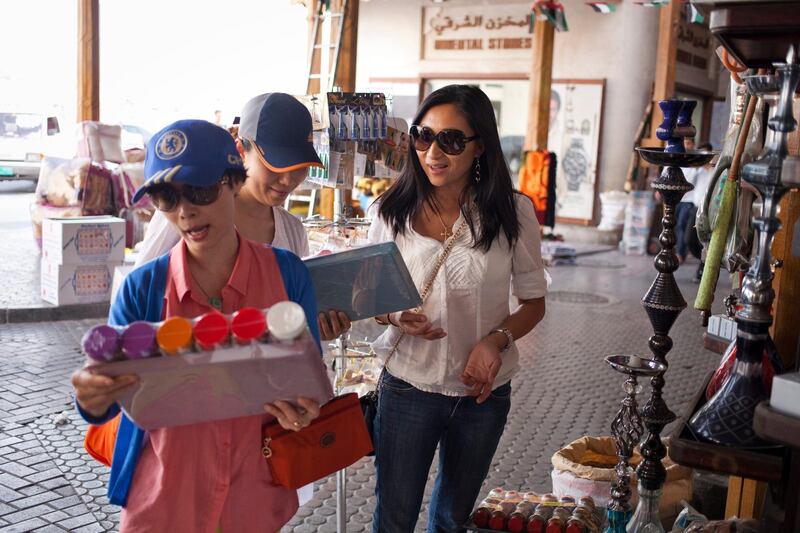“I always love visiting Dubai. It’s such a vibrant city with a lot of energy,” says Chloe Reuter, the chief executive of one of Asia’s leading independent luxury communications agency Reuter Communications.
After establishing it as a go-to communications agency for prestige brands that want to tap into China’s booming consumer market, she’s just opened the doors to a new office in Dubai.
"People are very open and there is definitely a can-do attitude which is what we are always looking for when we open a new office. We definitely think it’s the right time with a lot of exciting developments in the design and art scene, and Dubai 2020 on the horizon as well.”
Ms Reuter moderated two panels on how to attract Chinese Millenials and Chinese luxury travellers at Arabian Travel Market (ATM) in May. “I loved the mix of keynotes and panels at ATM and had the opportunity to meet a lot of new people, as well as see old friends working in hospitality.”
Dubai’s cosmopolitan environment resonates for Ms Reuter, a lifelong expat. Born to parents from Luxembourg and the UK, she was raised in Brussels and moved to Asia in 1993. She speaks fluent French, Italian and Mandarin Chinese.
"Not having a sense of strong affinity with any one country is an asset as it means I feel very much ‘home’ when I am in Shanghai,” she says. “The best outcome of being an expatriate is to be a ‘global citizen’. This means I can focus on building the business and not feel pressured to return anywhere.”
After studying Chinese at Durham University, UK and the People’s University of China in Beijing, she worked as a journalist for Reuters TV and Bloomberg TV in Tokyo before moving into communications, heading up advertising agency DDB China Group’s corporate communications in Shanghai.
Ms Reuter saw a gap in the market for an independent communications agency specialising in the luxury sector, and set up Reuter Communications in 2010 in Shanghai. A second office opened in Hong Kong, a third now in Dubai and a Singapore office is set to follow.
“I had always wanted to build a business,” she says. “There is a real ‘can-do’ attitude in Shanghai and there are a lot of entrepreneurs. It’s inspiring to live and work here. I saw an opportunity in 2010 to create a different type of communications agency that would work exclusively with luxury brands, helping them to understand and thrive in China.”
What she has created is an award-winning integrated marketing agency to help luxury brands establish a digital and social media presence, PR strategy and communications in China and Asia. The firm services clients in hospitality, fashion, jewellery, beauty and art, including Swarovski, Harrods, Delvaux, Farfetch, Aman, Ritz Carlton, Gemfields and Sotheby’s.
In the UAE the company is already working with high-end retail and hospitality brands who want to connect with Chinese luxury consumers.
“We decided to open now since this is the perfect moment to ride the wave of growth in Chinese outbound travel. If you just consider that only 9 per cent of Chinese nationals hold passports and passport holders are forecast to double in number by 2020, according to [Chinese travel booking site] Ctrip – the opportunities here are enormous.”
_______________
Read more:
Abu Dhabi hotel guest numbers up 7% in 2018 on increased arrivals from Asia
Thailand’s snail-oil salesmen cash in on Chinese tourism boom
_______________
With 120 million Chinese outbound trips last year and a projected 200 million by 2020, according to Phocuswright, Chinese travellers represent the most important spenders globally and they are becoming more adventurous in their travel choices, says Ms Reuter. “When outbound tourism in China first developed, the most popular destinations were neighbouring Asian countries and Europe. However, as affluent Chinese are becoming more travelled and opt for less the conventional and seek more diverse destinations, this is a huge opportunity for Middle East and GCC destinations, since they are at that perfect crossroads of adventure travel, comfort, luxury and shopping.”
Already there are signs that the UAE is becoming a key destination. Dubai Tourism Authority figures indicate a 12 per cent year-on-year increase in Chinese travellers to Dubai in the first quarter in 2018, making China one of the emirates’ top five source markets. Key drivers include excellent transport links between hubs in Asia and the UAE, flight times that are shorter than to Europe or the US, and extensive shopping.
Chinese visitors are the now the biggest spenders at Dubai International Airport, Ms Reuter says, and, as Dubai now hosts more international brands than anywhere else in the world, according to CBRE, she says more discerning Chinese shoppers will come to the emirate to buy brands that they can’t find back home.
But it’s crucial to understand the China market properly in order to sell into it, warns Ms Reuter. Luxury consumers in China have a different take on luxury from those in Europe.
“First, they haven’t experienced first-hand the weight of a brand’s heritage. For example, Europeans have experienced and seen luxury brands for generations, so there is an affinity linked to history and ownership over time that is missing in the Chinese luxury consumer experience, whose exposure to luxury brands is relatively recent. Exactly for this reason, the Chinese luxury consumer is not rooted in traditionalism and is most probably more open to adopting new trends than their western counterparts."
“Second, Chinese luxury consumers have very quickly changed to become increasingly discerning, sophisticated and savvy, which means they don’t rely solely on the popularity of a brand anymore, or on the logo being visible or not,” she says. “Instead they consume luxury in a more holistic approach, they engage with brands on a much more personal, intimate level – this is the case specifically for affluent individuals in China’s tier 1 and 2 cities. They are more likely to feel engaged by products and services if they first sympathise with and are touched by the brand’s story, its values and what it represents to them.”
Chinese influencer culture is very strong, as in China consumers trust peers more than traditional advertising, says Ms Reuter. Getting collaborations and social media campaigns right and reaching out to consumers on the appropriate digital platforms is vital.
In Reuter Communications, companies in the Middle East have an agency that can navigate and understand China and Asia’s luxury marketing and communications landscape. Mena region director Jeremy Tran manages a team in Shanghai so is still connected on a daily basis with latest developments in the market there.
“From an organisational point of view, decisions made from HQ outside of China for the China market often fail to tackle the local market demands,” says Ms Reuter.
“Our work at Reuter Communications helps preventing these very discrepancies.”






